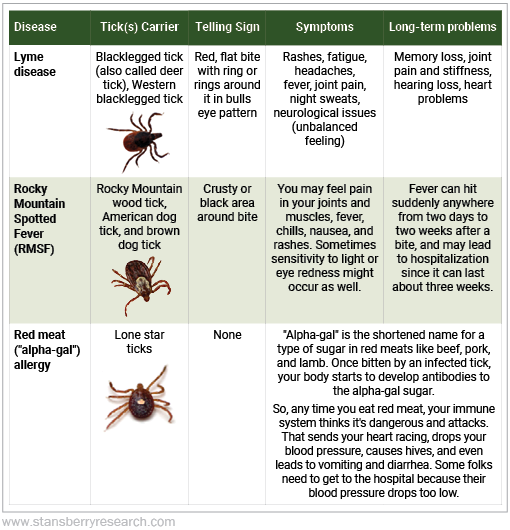Nowhere in the U.S. is safe...
No matter what state you're in, ticks are an ever-present pest... Yes, that even includes Alaska.
And for the past few years, experts have warned of higher-than-average tick populations. Unfortunately, this year, the forecast is the same – lots of ticks and lots of tick-borne diseases.
Right now, it might not seem like cause to worry. Relatively few folks contract tick-borne diseases each year. But these diseases are on the rise (and many are undiagnosed). If you don't know what to look for, you might delay treatment... and risk a fatal reaction.
So today, we wanted to discuss three tick-borne diseases on the rise and how to keep yourself safe this summer.
Lyme disease is the most prevalent tick-borne disease, with 42,743 reported cases in 2017, according to the Centers for Disease Control and Prevention ("CDC"). But some estimates put the actual number of infections much higher at about 300,000. Most cases go unreported because the symptoms of Lyme disease mimic other diseases, which accounts for this gap.
Similarly, we've seen more cases of Rocky Mountain spotted fever ("RMSF") as well. But the fatality rate dropped drastically from 30% before antibiotics were available to about 0.5% today – despite a sharp increase in infections. In 2000, there were about 495 cases. In 2017, that number was up to 6,248. Without antibiotics, the fatality rate is still high, with one study showing at least 70% of seniors dying from RMSF if left untreated.
And finally, there's a newcomer to the group... We've only just started to understand a disease triggered by a bite from the lone star tick. This disease makes your body develop antibodies to a sugar found in red meat. That in turn makes you severely allergic to beef, pork, lamb, and other red meats.
Here's a brief overview:

Don't let the tick names fool you, either. These pests are found throughout the country and even as far north as Alaska. Some even hitchhiked to Hawaii. That's why no matter where you spend time this summer, you need to keep yourself safe.
How to Avoid Ticks
If you do have a tick on you, use a pair of tweezers to remove it. Be sure to get the head... If the head stays attached, go to your doctor to avoid any infection. It does take time for many of these diseases to transmit to humans, so be sure to check yourself as soon as possible after time outdoors.
We recommend saving the tick in case you need testing. You can put it in a sealed plastic bag either by itself or with some alcohol. But the best way to avoid ticks is with good prevention, including these four tips:
1. Know your surroundings. Most ticks live in wooded areas and in high grass. But they also infest yards with trees and any place where deer roam. In fact, one of my researchers recently saw a handful of ticks in her backyard – something she tells me hasn't happened before.
You might not have high grass, but if deer regularly cross your garden, be on the lookout for ticks. Similarly, ticks hitchhike on other animals (and other people). So you might find them even in cities. Be alert and check yourself regularly.
2. Check yourself and your pets. Any time you go out under trees, in a wooded area, or in high grass, do a tick check when you return. Be sure to run hands through your hair, feeling the scalp for any small bumps. Check your ears, your groin, under your arms, inside your belly button, the backs of your knees, and around your waist. Shake out your clothes, too.
And don't forget Fido. Dog ticks got their name because they prefer our pets. But dog ticks can transfer to humans. So whenever you let Fido back inside the house, do a proper check for ticks. A brush or flea comb will help with hair, and be sure to check paw pads and ears, too (you can see more right here). And use a tick-prevention option. Collars or drops work well to ward off both fleas and ticks.
3. Wear the right clothes. Wear long-sleeved shirts and pants tucked into your socks. Also invest in a summer hat for whenever you go into areas where ticks may live. If you also dress in lighter colors, ticks are easier to spot.
4. Try a spray. We typically don't recommend anything containing DEET because of the harmful chemicals. But we do like (and use) oil of lemon eucalyptus. It lasts about as long and deters not just ticks, but mosquitoes as well. Find it right here.
Following these four steps will help keep you disease-free this summer no matter where you go. If you have any tips for dealing with ticks or other pests this summer, we'd love to hear them – send them to us at [email protected].
What We're Reading...
- How to keep ticks out of your yard.
- Something different: Billions of cicadas are about to emerge.
Here's to our health, wealth, and a great retirement,
Dr. David Eifrig and the Health & Wealth Bulletin Research Team
April 8, 2021
